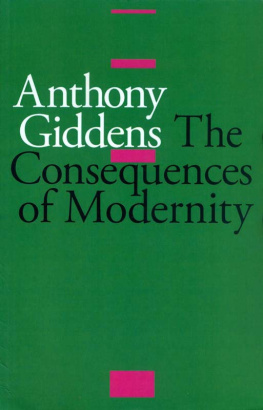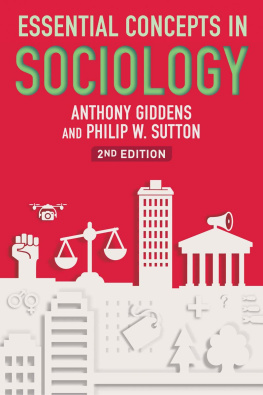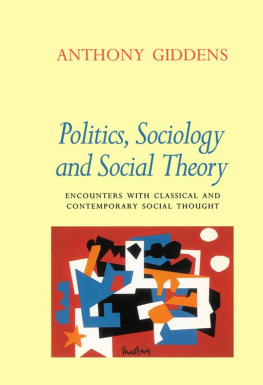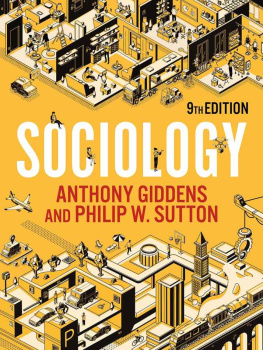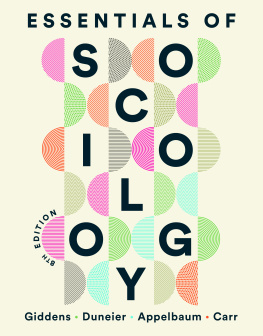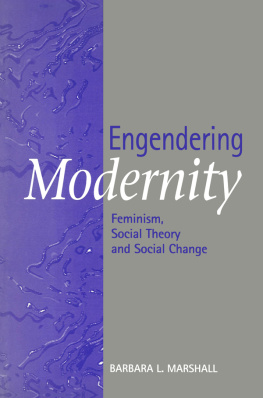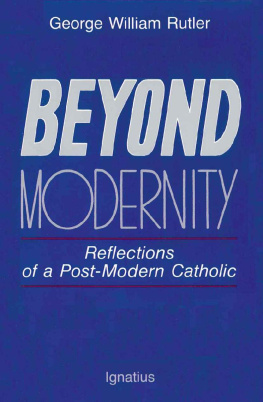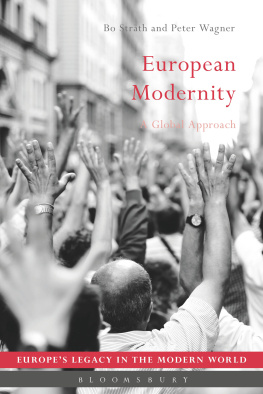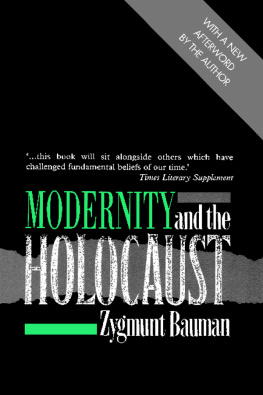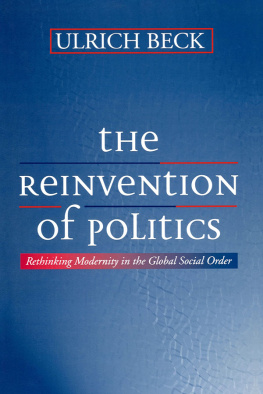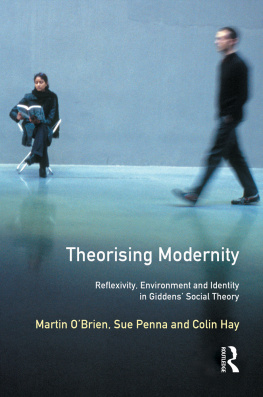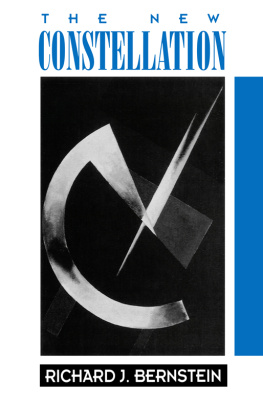The Consequences
of Modernity
_______________
Anthony Giddens
_______________
POLITY
Copyright 1990 by the Board of Trustees of the Leland Stanford Junior University
Originating publisher, Stanford University Press, Stanford, CA
First published in the United Kingdom 1990 by Polity Press
in association with Blackwell Publishing Ltd.
First published in paperback 1991
Reprinted 1992, 1993, 1994, 1995, 1996, 1997, 2000, 2003, 2004, 2005, 2006, 2007 (twice), 2008, 2009 (twice), 2010, 2012
Polity Press
65 Bridge Street
Cambridge CB2 1UR, UK
Polity Press
350 Main Street
Malden, MA 02148, USA
All rights reserved. Except for the quotation of short passages for the purposes of criticism and review, no part of this publication may be reproduced, stored in a retrieval system or transmitted, in any form or by any means, electronic, mechanical, photocopying, recording or otherwise, without the prior permission of the publisher.
Except in the United States of America, this book is sold subject to the condition that it shall not, by way of trade or otherwise, be lent, re-sold, hired out, or otherwise circulated without the publishers prior consent in any form of binding or cover other than that in which it is published and without a similar condition including this condition being imposed on the subsequent purchaser.
ISBN 978-0-7456-6643-3 (Multi-user ebook)
A CIP catalogue record for this book is available from the British Library.
Printed in Great Britain by the MPG Books Group
For further information on polity please visit our website: www.politybooks.com
Preface
____________
This book essentially takes the form of an extended essay. I have divided it up into sections, rather than formal chapters, in order to develop the flow of the arguments in an uninterrupted fashion. The ideas expressed herein are directly bound up with my previous writings, and I have often made reference to these. I hope the reader will understand and forgive such frequent self-referencing, which is intended not as hubris but as a mode of providing backing for claims that cannot be exhaustively defended in a work of this brevity. The book began life in the shape of the Raymond Fred West Memorial Lectures, which I delivered at Stanford University, California, in April 1988. I am very grateful to my hosts at Stanford on that occasion, whose welcome and hospitality was wonderful. In particular, I am indebted to Grant Barnes, of Stanford University Press, who was instrumental in gaining me the invitation to give the lectures and without whom this work would not exist.
Figures and Tables
____________
Figures
Tables
What if this present were the worlds last night?
John Donne, Devotions upon Emergent Occasions
______________
Imaginary time is indistinguishable from directions in space. If one can go north, one can turn around and head south; equally, if one can go forward in imaginary time, one ought to be able to turn around and go backward. This means that there can be no important difference between the forward and backward directions of imaginary time. On the other hand, when one looks at real time, theres a very big difference between the forward and backward directions, as we all know. Where does this difference between the past and the future come from? Why do we remember the past but not the future?
Stephen W. Hawking, A Brief History of Time
______________
In March 1986, a nine-page article about the Chernobyl nuclear installation appeared in the English-language edition of Soviet Life, under the heading of Total Safety. Only a month later, over the weekend of the 2627 April, the worlds worst nuclear accidentthus faroccurred at the plant.
James Bellini, High Tech Holocaust
______________
When we discover that there are several cultures instead of just one and consequently at the time when we acknowledge the end of a sort of cultural monopoly, be it illusory or real, we are threatened with the destruction of our own discovery. Suddenly it becomes possible that there are just others, that we ourselves are an other among others. All meaning and every goal having disappeared, it becomes possible to wander through civilisations as if through vestiges and ruins. The whole of mankind becomes an imaginary museum: where shall we go this weekendvisit the Angkor ruins or take a stroll in Tivoli of Copenhagen.
Paul Ricoeur, Civilisations and National Cultures,
in his History and Truth
Contents
____________
_______
,
_______
,
_______
,
_______
,
_______
,
_______
,
I
_______
Introduction
In what follows I shall develop an institutional analysis of modernity with cultural and epistemological overtones. In so doing, I differ substantially from most current discussions, in which these emphases are reversed. What is modernity? As a first approximation, let us simply say the following: modernity refers to modes of social life or organisation which emerged in Europe from about the seventeenth century onwards and which subsequently became more or less worldwide in their influence. This associates modernity with a time period and with an initial geographical location, but for the moment leaves its major characteristics safely stowed away in a black box.
Today, in the late twentieth century, it is argued by many, we stand at the opening of a new era, to which the social sciences must respond and which is taking us beyond modernity itself. A dazzling variety of terms has been suggested to refer to this transition, a few of which refer positively to the emergence of a new type of social system (such as the information society or the consumer society) but most of which suggest rather that a preceding state of affairs is drawing to a close (post-modernity, post-modernism, post-industrial society, post-capitalism, and so forth). Some of the debates about these matters concentrate mainly upon institutional transformations, particularly those which propose that we are moving from a system based upon the manufacture of material goods to one concerned more centrally with information. More commonly, however, these controversies are focused largely upon issues of philosophy and epistemology. This is the characteristic outlook, for example, of the author who has been primarily responsible for popularising the notion of post-modernity, Jean-Franois Lyotard. As he represents it, post-modernity refers to a shift away from attempts to ground epistemology and from faith in humanly engineered progress. The condition of post-modernity is distinguished by an evaporating of the grand narrativethe overarching story line by means of which we are placed in history as beings having a definite past and a predictable future. The post-modern outlook sees a plurality of heterogeneous claims to knowledge, in which science does not have a privileged place.
A standard response to the sort of ideas expressed by Lyotard is to seek to demonstrate that a coherent epistemology is possibleand that generalisable knowledge about social life and patterns of social development can be achieved. But I want to take a different tack. The disorientation which expresses itself in the feeling that systematic knowledge about social organisation cannot be obtained, I shall argue, results primarily from the sense many of us have of being caught up in a universe of events we do not fully understand, and which seems in large part outside of our control. To analyse how this has come to be the case, it is not sufficient merely to invent new terms, like post-modernity and the rest. Instead, we have to look again at the nature of modernity itself which, for certain fairly specific reasons, has been poorly grasped in the social sciences hitherto. Rather than entering a period of post-modernity, we are moving into one in which the consequences of modernity are becoming more radicalised and universalised than before. Beyond modernity, I shall claim, we can perceive the contours of a new and different order, which is post-modern; but this is quite distinct from what is at the moment called by many post-modernity.

